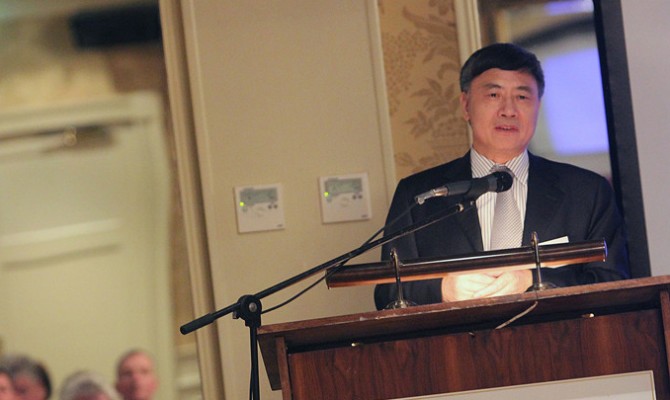
Speaking during a visit to the Society for International Affairs last Wednesday, Jianguo said that potential Chinese partners in higher education “would not have been happy” that the head of the Central Tibetan Administration, Lobsang Sangay – whom he dismissed as a “troublemaker” – visited Trinity College to receive an honour from the College Historical Society in 2012.
Tibet
“I would like to say that Lobsang is a representative of the separatist forces trying to split Tibet from China,” he said. “It is widely recognised throughout the world that Tibet is part of China, including [by] the Irish and the American governments.” He added: “I can say confidently that because of this particular visit, [Trinity’s] potential [academic] partners in China would not be happy, and the [Chinese] students studying at Trinity or Chinese members of the teaching faculty would not be happy, and, in learning this news, the general Chinese public would not be happy.”
Jianguo, who was, for a time, an academic at Zhejiang University, had earlier begun his speech by saying that he “love[s] the atmosphere of a university campus and enjoys talking with university students.” China, he said, had “become a hot topic throughout the world” and the country would “definitely be an important part” of the future careers of those in attendance. Calling China “a world leader for 1,500 years, before the emergence of the British Empire,” he said that “colonial occupation and profound humiliation [had] reduced China into one of the weakest countries in the world” leaving a “lasting imprint on the memory and character of the Chinese nation.” This history is why the Chinese “cherish sovereignty and territory so dearly.”
Ireland-China relations
He noted that the period from 1840-1949 – what he described as a “miserable century” – coincided with turbulent Irish history.
“The China-Ireland relationship has never been better,” he said, “despite the great distance between our two countries and obvious difference in size.” The two “economies are highly complementary” and an “overwhelming majority of our peoples would like to see” an increase in cooperation, in the hope of “bring[ing] tangible benefits.”
Discussing the “exceptional progress” of China’s economy since former Chinese leader Deng Xiaoping’s reforms, Jianguo said that, in the past 30 years, Chinese national income had grown annually by an average of 9.8%, lifting 680m Chinese people out of poverty. But while the country had “laid a solid foundation for continued growth”, it faces a serious challenge to continue sustainable growth into the future, he said.
After his speech, Jianguo took questions from the floor and answered through a translator.
Human rights
Asked how a slowing economy and aging population would affect China’s human rights policy, Jianguo said the country “attaches great importance to safeguarding the human rights of the Chinese people” and that the budget for social programmes continues to rise. “I’d like to say that it should be recognised that China, with its development and growth, has been taking greater and greater responsibilities,” he said. “Not everyone may be aware that China happens to be the greatest peace-keeping contributor among the five members of the [UN] Security Council.”
The ambassador, noting Michael D. Higgins’ state visit to China last year, praised the Irish president as a “strong and reputable advocate of human rights” whose opinion he particularly values. According to Jianguo, Higgins “appreciates the differences in core pursuits between countries at differing developing stages, and recognises that in a developing country like China the most important human rights are the right to subsistence and right to develop.”
Jianguo said he did not any appropriateness in external forces trying to meddle with Hong Kong affairs.
One questioner asked about the environmental documentary Under the Dome which had been viewed hundreds of millions of times before being removed from Chinese video websites. Jianguo said that, while “not in a position to make meaningful comment”, he had seen the documentary and “admired [the director’s] courage and efforts which have successfully raised the awareness [of environmental issues] in China.” The questioner persisted, asking how removing the video was contributing to environmental awareness. “I would highlight the fact that it was accessible for some time and a lot of people, including diplomats like us working overseas, had the opportunity to watch it,” he replied. The documentary maker, Chai Jing, “cited many examples and presented data to the audience,” he said, and “I’m not in a position to tell whether those statistics were right or to be trusted.”
In response to a question about Hong Kong, the ambassador said that, “Hong Kong affairs” are considered “internal affairs” and that he “did not see any appropriateness in external forces trying to meddle with Hong Kong affairs.” Addressing the British questioner, he said, “I’d like to call your attention to the fact that, during the period of colonial occupation by the British, there was never a democratic election.” Stressing China’s commitment to abide by its agreement with regard to Hong Kong, he bemoaned that, “despite our sincerity and progress,” China receives criticism from western countries and media. “This makes me wonder, Why?”
Photo: Lorraine Teevan






